Monitor "APS1 & APS2" parameters on the scantool.
Pedal Position | Output Voltage(V) [Vref = 5.0V] | |
APS1 | APS2 | |
C.T | 0.7 ~ 0.8V | 0.275 ~ 0.475V |
W.O.T | 3.8 ~ 4.4V | 1.75 ~ 2.35V |
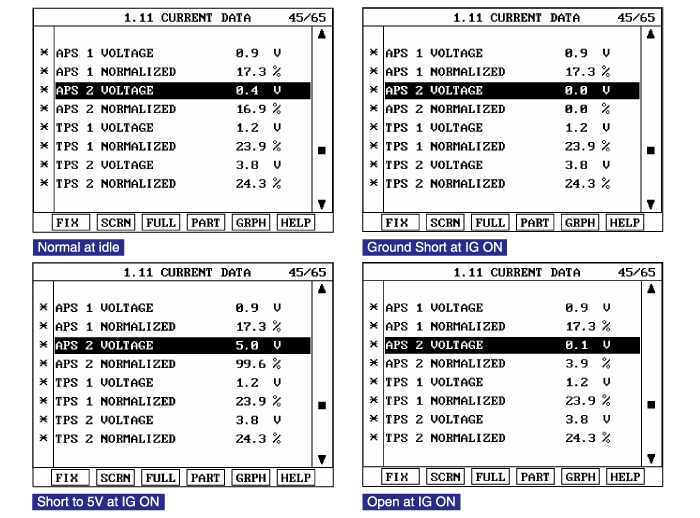
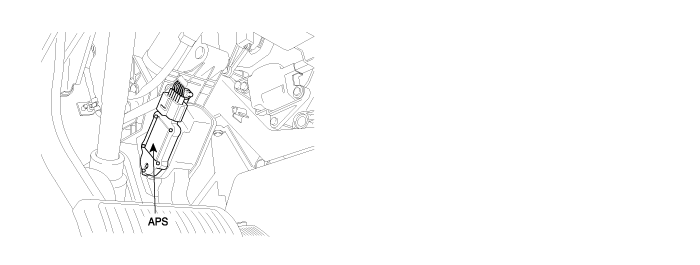
APS(Acceleration Position Sensor) measures driver's accelerating intension using a potentiometer and APS signal is transmitted to the PCM. The pedal's position is converted as voltages of potentiometer in the APS.The absence of a mechanical link between the accelerator pedal and throttle valve presents a risk of loss of control of the engine in the event of a failure of the component. Therefore, APS has the two potentiometers whose slides are mechanically solid. APS 2 decides whether or not APS 1 & 2 is faulty.
Checking output signals from APS 2, under detecting condition, if output signals are above the threshold, PCM sets P2128. MIL(Malfunction Indication Lamp) turns on when the malfunction lasts till 1 driving cycle.
Item | Detecting Condition | Possible Cause | |
DTC Strategy | ● This code detects a continuous short to ground or open in either the circuit or the sensor | ● Poor connection ● Short to battery in Signal Circuit ● Open in Ground Circuit ● Faulty APS ● Faulty PCM | |
EnableConditions | ● Ignition "ON" | ||
Threshold | ● APS2 〉 3V | ||
Diagnosis Time | ● Continuous (More than 0.18sec. Failure for every 7.8sec. Test) | ||
MIL On Condition | ● 1 Driving Cycle | ||
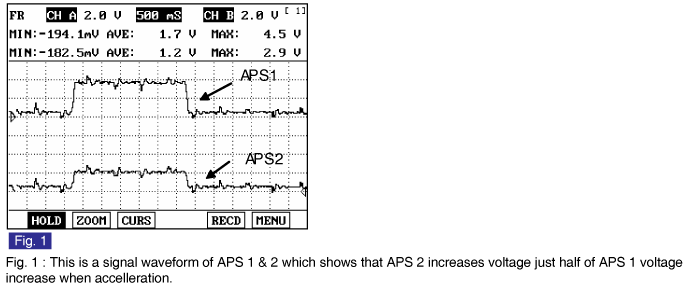
Pedal Position | Output Voltage(V) [Vref = 5.0V] | |
APS1 | APS2 | |
C.T | 0.7 ~ 0.8V | 0.275 ~ 0.475V |
W.O.T | 3.8 ~ 4.4V | 1.75 ~ 2.35V |
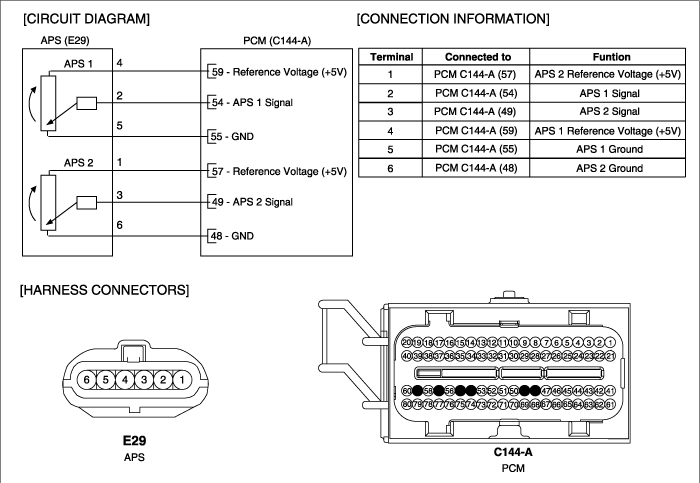
Connect scantool to DLC(Data Link Connector).
Warm up the engine to normal operating temperature.
Monitor "APS1 & APS2" parameters on the scantool.
Pedal Position | Output Voltage(V) [Vref = 5.0V] | |
APS1 | APS2 | |
C.T | 0.7 ~ 0.8V | 0.275 ~ 0.475V |
W.O.T | 3.8 ~ 4.4V | 1.75 ~ 2.35V |

Are those "APS1 & APS2" parameters displayed correctly ?

▶Fault is intermittent caused by poor contact in Sensor’s and/or PCM’s connector or was repairedand PCM memory was not cleared. Thoroughly check connectors for looseness, poorconnection, bending, corrosion, contamination, deterioration, or damage. Repair or replaceas necessary and go to "Verification of Vehicle Repair" procedure

▶Go to "Terminal and connector inspection" procedure.
Many malfunctions in the electrical system are caused by poor harness and terminals. Faults can also be caused by interference from other electrical systems, and mechanical or chemical damage.
Thoroughly check connectors for looseness, poor connection, bending, corrosion, contamination, deterioration, or damage.
Has a problem been found?

▶ Repair as necessary and go to "Verification of Vehicle Repair" procedure

▶ Go to "Signal Circuit Inspection " procedure.
Check short to battery in harness
IG "OFF".
Disconnect APS and PCM connector.
Measure resistance between terminal 1 and 3 of APS harness connector.
Measure resistance between terminal 3 and 4 of APS harness connector.
Specification : Infinite
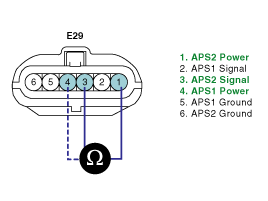
Is the measured reisistance within specification ?

▶ Go to "Ground Circuit Inpsection" procedure.

▶ Repair or replace as necessary and then, go to "Verification of Vehicle Repair" procedure.
Check open in harness
IG "OFF"
Disconnect APS connector.
Measure voltage between terminal 1 of APS harness connector and chassis ground.(Fig. A)
Measure voltage between terminal 1 and 6 of APS harness connector.(Fig. B)
Specification : Fig."A" - Fig. "B" = Approx. below 200mV

Is the measured voltage within specification ?

▶ Go to "Component Inspection" procedure.

▶ Repair or replace as necessary and then, go to "Verification of Vehicle Repair" procedure.
Check APS
Ignition "ON" & ENG "OFF".
Measure waveform of APS by pressing and depressing accellerator pedal with scantool.
Pedal Position | Output Voltage(V) [Vref = 5.0V] | |
APS1 | APS2 | |
C.T | 0.7 ~ 0.8V | 0.275 ~ 0.475V |
W.O.T | 3.8 ~ 4.4V | 1.75 ~ 2.35V |
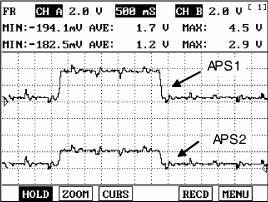
Is the measured signal waveform O.K ?

▶ Substitute with a known-good PCM and check for proper operation. If the problem is corrected,replace PCM and then go to "Verification of Vehicle Repair" procedure.
There is a memory reset function on scantool that can erase optional parts automaticallydetected and memorized by PCM.
Before or after testing PCM on the vehicle, use this function to reuse the PCM on the others

▶ Substitute with a known-good APS and check for proper operation. If the problem is corrected,replace APS and then go to "Verification of Vehicle Repair" procedure.
After a repair, it is essential to verify that the fault has been corrected.
Monitor and record the Freeze Frame Data for the Diagnostic Trouble Code(DTC) which has been diagnosed.
Using a Scantool, Clear the DTCs
Operate the vehicle within conditions noted in the freeze frame data or enable conditions
Monitor that all rediness test have been verified as " Complete "
Are any DTCs present ?

▶ Go to the applicable troubleshoooting procedure.

▶ System is performing to specification at this time.